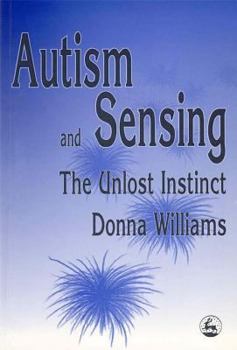Autism and Sensing: The Unlost Instinct
Expanding on themes of her previous book, Autism: An Inside-Out Approach, Donna Williams explains how the senses of a person with autism work, suggesting that they are 'stuck' at an early development stage common to everyone. She calls this the system of sensing, claiming that most people move on to the system of interpretation which enables them to make sense of the world. In doing so, as well as gaining the means of coping with the world, they...
Format:Paperback
Language:English
ISBN:1853026123
ISBN13:9781853026126
Release Date:May 1998
Publisher:Jessica Kingsley Publishers
Length:200 Pages
Weight:0.65 lbs.
Dimensions:0.4" x 6.1" x 9.1"
Customer Reviews
4 ratings
Packed full of food for thought
Published by Thriftbooks.com User , 16 years ago
Interesting, interesting, interesting. I have, as far as I know, no characteristics related to autism, but I am truely amazed at Donna's excellent ability to describe the varioius "shifts" in perception related to her autism. Thank goodness she has the ability to describe her experiences so that people might better understand autism, and the workings of the human brain in general. I can especially relate to her description of "lemon-ness" (you have to read the book - too difficult for me to paraphrase here). This little book, as one other reviewer mentioned, is packed full of insight. Thanks, Donna, for an excellent read.
A work of genius
Published by Thriftbooks.com User , 18 years ago
I am a philosopher and expert hypnotist, and this book is the finest exposition of 'low-level' perception and apperception that I have ever read. Anyone interested in issues of consciousness and altered states of awareness should read this superbly well-written book.
A challenging and innovative exploration of where Autism ends and Asperger's begins.
Published by Thriftbooks.com User , 19 years ago
Donna Williams is not an expert but an explorer of ideas. Here we see an intriguing theory about Autism as a state before the ability to process information with meaning and conscious awareness; a place of Sensing. As someone who didn't grasp meaning of what she saw or heard until very late in childhood, Donna describes what the world was like in a preconscious state of pattern, theme and feel. She contrasts this strikingly with what it was like to then develop awaress of meaning in incoming language and to look past the purely sensory and pattern form of objects to try to find their intellectual concept and, hence, link them with thought and language. In this sense, Autism And Sensing is an amazing exploration because most people on the Autistic Spectrum who do communicate developed the capacity to understand meaning or hold conscious awareness long before Donna did. Hence they usually can tell us what it was like to have Autistic behaviours or facinations but they can't so easily tell us what it was like as a whole to navigate a world without meaning or what it was like to be almost out of childhood and discover meaning existed and try to learn its system and use it as most people do. She covers things like how this changes identity and sense of self which tells us a whole other social-emotional dimension to what people with Autism may experience in moving what may for them be like moving between two very different worlds. Donna described the more intellectual but literal world of people with Asperger's who have always known and relied upon a relatively fluent system of meaning, but contrasts it strongly with the Autistic end of the spectrum when everything is known through movement and the body rather than the mind. Its a challenging concept given we don't have a clear idea yet where Autism ends and Asperger's begins. But if Donna is right then this book may help us indicate who is where on the spectrum according to how they process information rather than how 'Autistically' they behave and to shape learning and development programs accordingly both for those who, like Donna, were able to later develop some processing skills more akin to Apserger's and those with Autism who are not but could be, nevertheless, relatively able. Donna's writing and structure is always unusual but then we are reading the work of someone who didn't learn to understand three sentences in a row until she was nine years old. This in itself is informative if we judge it on its own terms. What's without doubt is that it takes a great deal of courage to write on a subject as intangible as Sensing and then give it to a world of readers who will read it with minds that have always known Interpretation and meaning.
Donna does it again!
Published by Thriftbooks.com User , 23 years ago
To date, this is absolutely the most fascinating and wonderful book about Autism! She has an amazing gift to explain an entirely different world, her own and so many of my friends. This book has given me extraordianry insight and understanding for my friends who live with Autism. I think this is a must read for everyone!





